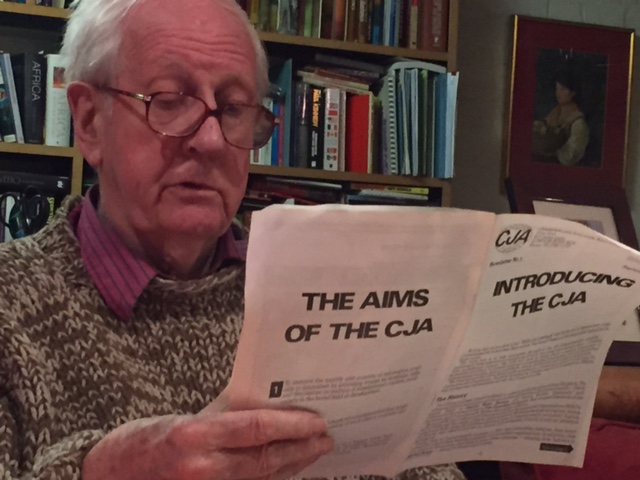 Derek Ingram was a founder member of the Commonwealth Journalists Association as well as writing Commonwealth Update for The Round Table Journal [photo: Rita Payne]
Derek Ingram was a founder member of the Commonwealth Journalists Association as well as writing Commonwealth Update for The Round Table Journal [photo: Rita Payne]
[This is an excerpt from an article appearing in the current issue of The Round Table: The Commonwealth Journal of International Affairs]
While at the helm of Gemini, Ingram travelled extensively within the Commonwealth and met frequently with many of its leaders. He was a fixture in the press-rooms of Commonwealth conferences, with many journalist colleagues turning to him as a font of knowledge about the organisation. Ingram used his prominence in the journalistic field and the attention afforded by Commonwealth summits to advocate publicly for the principles of the Commonwealth and for progress within it. At the 1979 meeting, which was dominated by the issue of Rhodesia, Ingram wrote a widely reproduced open letter to Margaret Thatcher strongly condemning her obstructionism and urging her to embrace the summit as a forum in which meaningful headway could be made. Gemini ran a special service during Commonwealth conferences, providing subscribing newspapers with Ingram’s daily dispatches.
Alongside his writing, Ingram made several other key contributions to the association. He was central to many Commonwealth civil society organisations, making important interventions across many decades. For example, he was constantly chivvying organisations such as the Royal Commonwealth Society (RCS) to modernise. As early as 1973, he was pushing for the removal of Cecil Rhodes from the society’s headquarters, arguing ‘Rhodes is a highly controversial figure in Commonwealth terms and one that is anathema to many who believe in today’s Commonwealth and not in yesterday’s Empire’.
Ingram established the Commonwealth Journalists Association (CJA) in 1978 alongside the Guardian’s Patrick Keatley, which played a key role in training young journalists across the association and fostering Commonwealth-wide professional networks. He was co-founder of the Commonwealth Human Rights Initiative in 1987. Ingram was a member of this journal’s editorial board (the ‘Moot’) from 1971 and contributed regular ‘Commonwealth updates’ from 1983. As the journal took a more academic turn, he consistently argued for policy relevance, coverage of current affairs and timely commentary in its pages. Here, as with Gemini, the CJA and the RCS, his interest was firmly in the present and future, rather than the past.
Ingram also worked closely with the Commonwealth Secretariat from its inception in 1965, supporting its work, collaborating closely with its information team, acting as an election observer, and building firm friendships, including with several secretaries general. Despite these connections, Ingram remained vocal about the Commonwealth’s failures as well as its successes. Engaging critically, but seriously, with the Commonwealth as a political project should be seen as one of his greatest contributions.
Ingram gave shape to the Commonwealth not only through his writings but also through his practices. He made connections everywhere; in regions such as southern and eastern Africa, where Gemini had considerable influence, Ingram is still fondly remembered. Veteran Zambian journalist Jones Kaumba noted in 2011, for example:
[Y]ou can’t talk about journalism without talking about Ingram…Not only me, virtually all Zambian journalists have a lot of respect for that gentleman…[O]nce in a while you come across journalists like that who take their responsibility a bit further, and I think that’s what Ingram has done.
His home in London illustrated his global networks, his commitments, and his interests. Alongside bookshelves groaning with volumes about the Commonwealth and his personal archives, his house was adorned with ephemera representing more than 70 years of engagement: photographs between gun-toting border guards, letters from (in)famous politicians, and photographs of friends, family and colleagues. Ingram was legendary for his hospitality and sociability, and this itself should be seen as evidence of a broader political and ethical commitment to welcoming those from around the Commonwealth to London.
While Gemini and his belief in the possibilities of the Commonwealth may be seen as idealistic, many of Ingram’s commitments and ideas today seem increasingly important. Gemini sought to decolonise the news decades before ‘decolonising knowledge’ came to dominate academic and popular debates. His commitment to internationalism, anti-racism, and journalism for the public good seem even more important in 2018.
Ashley Crowson and Ruth Craggs are with the Department of Geography, King’s College London.
Related articles:
Remembering Derek Ingram – June 2018
Gemini’s news legacy and development journalism – January 2018
An anniversary to commemorate – October 2017



